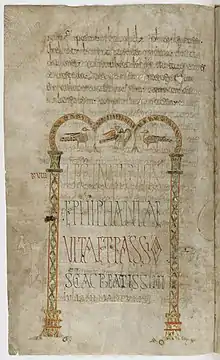
Musaeus of Marseilles (fl. c. 450)[1] was a priest from Massilia. According to Gennadius, he died "during the reign of Leo and Majorian", that is, between 457 and 461. We know very little about his life.
Apparently a prolific writer,[2] he was also an esteemed preacher whose sermons were read for edification.[3] We know that he put together a lectionary for Venerius, bishop of Marseilles, around 450 CE, and that he also prepared a responsorial and a sacramentary.[4][5] The sacramentary was in fact a "sort of plenary missal", and is the earliest known of its kind.[3]
Biography
Musaeus was active before the middle of the 5th century CE.[3] He was born in Massilia, once part of a Greek colony in southern France.[3] In a passage of his De Viris Illustribus, Gennadius described him thusly:
Musaeus, priest of the church of Marseilles, a man learned in the Divine Scripture and refined by the most subtle exercise of its interpretation, schooled, also in the language, selected, at the urging of the holy bishop Venerius, readings from the Holy Writings appropriate to the feast days of the entire year and responsorial psalms (responsoria psalmorum capitula) appropriate to the season and to the readings.[1]
He probably put together this lectionary about 450.[4] Gennadius goes on to state that this work proved indispensable for lectors in church.[6] He also addressed to Eustathius, the successor of Venerius, an "excellent and sizable Book of Sacraments, divided into various sections according to the offices and time, according to the text of the reading, sequence of the psalms, and chanting, but proper for praying to God and asking for the multitude of His favours."[6] This sacramentary showed his understanding and eloquence.[6] It is probable that this work "at least contained directions for the divine office rather than prayers for the mass".[7] The work has not survived.[4] Gennadius also states that it was said that he also delivered homilies.[6]
References
- 1 2 McKinnon, James W. (2000). The Advent Project The Later Seventh-Century Creation of the Roman Mass Proper. University of California Press. p. 65. ISBN 9780520221987. Retrieved 10 February 2022.
- ↑ Dupont, Anthony; Partoens, Gert; Leemans, Johan; Boodts, Shari (2018). Preaching in the Patristic Era Sermons, Preachers, and Audiences in the Latin West. Brill. p. 253. ISBN 9789004363564. Retrieved 12 February 2022.
- 1 2 3 4 Baumstark, Anton (2011). On the Historical Development of the Liturgy. Liturgical Press. p. 155; 275. ISBN 9780814660966. Retrieved 12 February 2022.
- 1 2 3 Old, Hughes Oliphant (1998). The Reading and Preaching of the Scriptures in the Worship of the Christian Church: The medieval church. W.B. Eerdmans. p. 82. Retrieved 11 February 2022.
- ↑ Margot E. Fassler Robert S. Tangeman Professor of Musicology and Director of the Institute of Sacred Music Yale University (2000). The Divine Office in the Latin Middle Ages Methodology and Source Studies, Regional Developments, Hagiography. Oxford University Press. p. 2000. ISBN 9780195352382. Retrieved 12 February 2022.
- 1 2 3 4 "Presbyter Musaeus from the church of Marseille (Gaul) is known for his knowledge of Scripture. He is the author of a lectionary and a sacramentary (ca AD 430-461). Account in the "Lives of Illustrious Men" by Gennadius of Marseille, writing in Marseille (Gaul), ca 490". www.presbytersproject.pl. Retrieved 11 February 2022.
- ↑ Moreton, Bernard (1976). The Eighth-century Gelasian Sacramentary A Study in Tradition. Oxford University Press. p. 20. Retrieved 12 February 2022.